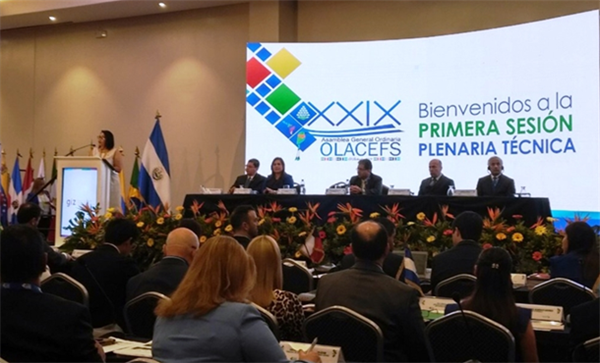The XXIX Ordinary General Assembly of OLACEFS held from 16 to 18 October 2019 placed emphasis on institutional integrity and the importance of new technologies in audit activities. During the General Assembly, the following issues were discussed: Application and legal validity of electronic signatures and electronic documents in the audit process; Gender equality in the OLACEFS member SAIs; Improvement of institutional integrity management – relevance in SAIs and in the public sector; Improvement of public integrity in the prevention and the fight against corruption; Cooperative audit for sustainable public procurement; Integrity in public-private partnerships: The role of SAIs.

The opening ceremony of OLACEFS- 29
The SAV contributed a speech on “The role of the SAV in strengthening public integrity through detecting frauds and combating against corruption” to theme 2 “Improvement of institutional integrity management – relevance in SAIs and in the public sector”. The speech emphasized that corruption is a social phenomenon that exists in both public and private sectors of all countries in the world. Not only does it create serious damages to public resources and to government systems, but also it threatens social justice and fairness, declines public trusts and hinders effort to reduce poverty and promote national development. Therefore, anti-corruption is one of the top concerns of all countries and SAIs are considered as effective tools to prevent and detect corruption through audit activities.
Almost all the countries in the world establish their own SAIs which assist them in supervising public finance and performance of public sector. SAIs have mandate in auditing government revenues and expenditures and act as supervisory agencies on public finance integrity with mission of evaluating effectiveness and efficiency of public funds in accordance with the Law.
As one of the pillars of the national integrity system and finance supervisory agencies, SAIs’ contribution to anti-corruption is mainly in two ways: prevention and detection.
With its legal status which specifies that “the SAV is a state financial inspection agency established by the National Assembly, operates independently and abides only by law, the SAV played an important role in preventing, detecting and handling corruption cases through audit activities.
SAV’s delegates discuss with participants of OLACEFS- 29
The SAV is a body working for transparency in budget finance through publication of audit conclusion on financial statements of organizations and budget levels. This is the basis for the National Assembly deputies, People’s Council deputies, state agencies, social organizations and citizens in monitoring the management and use of public finance.
The SAV is also an important institutions for detecting phenomena, signs of embezzlement, squandering, law violation in economic and financial management, inefficient use of financial resources and state assets. On that basis, the SAV suggests the competent state agencies need to promptly prevent and fight against corruption in accordance with law; proposes financial handling and thoroughly recovering the lost assets to the State; proposes solutions to improve mechanisms, policies and laws to contributions to anti-corruption. In case of detecting criminal signs, the SAV shall set up documents to suggest the law enforcement agencies to deal with the related subjects in accordance with the law.
On the basis of its independence privilege in auditing, the SAV could actively develop audit plan on areas that have potential risks of corruption and squandering public resources and social issues of public concerns.
SAV’s delegation at OLACEFS 29
In order to effectively perform its statutory responsibilities, the SAV has drawn a prime lesson which is imperial to ensure the balance of the following factors: adequate and comprehensive legal framework in support for the operation and organization of the SAV; audit standards, processes and modern audit methodologies; high-quality human resources with professional qualifications and ethics; close coordination with other key bodies of the national integrity system; enhanced cooperation with other SAIs; and the transparency, publicity and accountability of the State.
On the occassion of OLACEFS-29, the SAV Delegation engaged in bilateral contacts with some member SAIs of OLACEFS. They highly appreciated the SAV’s significant contributions in strengthening the cooperation between ASOSAI and regional organizations over the world as well as enhancing the development of INTOSAI.
As the Chairman of ASOSAI for the term of 2018- 2021, the SAV expressed a desire to have more chances for ASOSAI and OLACEFS to exchange experiences, knowledge and best practices in the fields of mutual concern; promote cooperative audit activities in the region, especially in the topics identified as OLACEFS’s strength such as: cooperative audit for water resources and sustainable development goals. The SAV also showed its expectation for the support and assistance by member SAIs in the professional activities of INTOSAI, particularly in the field of environmental and technology information auditing.
LÊ THU (dịch)